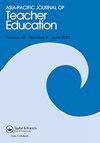Fluctuations in the professionality and professionalism of the teaching profession in Japan: a perspective against the “learnification” of teacher education
IF 1.6
3区 教育学
Q2 EDUCATION & EDUCATIONAL RESEARCH
引用次数: 2
Abstract
ABSTRACT In Japan, the complexity of the teaching profession has been downplayed in the course of repeated systemic reforms, wherein the profession is increasingly viewed as a technical operation. In response to this trend, the concept of “reflective practitioner” (Schön, D. A.) has been proposed as a counterpoint. While it has influenced the discussion of teacher education reform thereafter, it has also been coopted into what Gert Biesta calls “learnification” of teacher education. This paper outlines the trends and debates of teacher education reform in Japan and discusses ways to avoid the “learnification” of teacher education. This paper speaks directly to Item No. 1 of the 8 challenges put forward by the APJTE editors, which concerns the redefinition of teaching “as a technical operation aimed at the effective production of measurable learning outcomes” and its implications for teacher agency, identity and professionalism. It uses Japan as a case to depict the situation in which the trivialisation of teaching into a technical operation and the de-professionalisation of the teaching profession are proceeding not only through the action of educational policy but also through the interaction with discourses that are intended to criticise it.日本教师职业的专业性和专业性的波动:从教师教育的“学习化”看
摘要在日本,教师职业的复杂性在不断的系统改革中被淡化了,教师职业越来越被视为一种技术操作。为了应对这一趋势,“反思实践者”(Schön,D.A.)的概念被提出作为一种对比。虽然它影响了此后对教师教育改革的讨论,但它也被纳入了格特·比斯塔所说的教师教育的“学习化”中。本文概述了日本教师教育改革的趋势和争论,并讨论了如何避免教师教育的“学习化”。本文直接谈到了APJTE编辑提出的8项挑战中的第1项,该挑战涉及将教学重新定义为“旨在有效产生可衡量的学习成果的技术操作”及其对教师能动性、身份和专业性的影响。它以日本为例描述了这样一种情况:将教学淡化为技术操作和教师职业的非专业化不仅通过教育政策的行动进行,而且通过与旨在批评它的话语的互动进行。
本文章由计算机程序翻译,如有差异,请以英文原文为准。
求助全文
约1分钟内获得全文
求助全文
来源期刊

Asia-Pacific Journal of Teacher Education
EDUCATION & EDUCATIONAL RESEARCH-
CiteScore
4.40
自引率
7.70%
发文量
29
期刊介绍:
This journal promotes rigorous research that makes a significant contribution to advancing knowledge in teacher education across early childhood, primary, secondary, vocational education and training, and higher education. The journal editors invite for peer review theoretically informed papers - including, but not limited to, empirically grounded research - which focus on significant issues relevant to an international audience in regards to: Teacher education (including initial teacher education and ongoing professional education) of teachers internationally; The cultural, economic, political, social and/or technological dimensions and contexts of teacher education; Change, stability, reform and resistance in (and relating to) teacher education; Improving the quality and impact of research in teacher education.
 求助内容:
求助内容: 应助结果提醒方式:
应助结果提醒方式:


